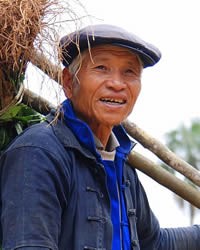Hani in Vietnam

Photo Source:
Takeaway - Wikimedia
Creative Commons
|
Send Joshua Project a map of this people group.
|
| People Name: | Hani |
| Country: | Vietnam |
| 10/40 Window: | Yes |
| Population: | 27,000 |
| World Population: | 780,000 |
| Primary Language: | Hani |
| Primary Religion: | Ethnic Religions |
| Christian Adherents: | 0.50 % |
| Evangelicals: | 0.06 % |
| Scripture: | Portions |
| Ministry Resources: | Yes |
| Jesus Film: | Yes |
| Audio Recordings: | Yes |
| People Cluster: | Hani |
| Affinity Bloc: | Tibetan-Himalayan Peoples |
| Progress Level: |
|
Introduction / History
This profile deals only with the speakers of "Hani proper." The Hani language consists of three tones and five dialects. Differences with each of the major dialects "are relatively small, and speakers from the different sub-dialects can generally understand each other." A Hani Roman alphabet was introduced in 1957 but was never widely embraced by the Hani who today have a low literacy rate.
What Are Their Lives Like?
The Hani are needy and poverty-stricken people. They have a high infant mortality rate. Most are subsistence farmers.
What Are Their Beliefs?
The Hani have three major religious clergymen. The zuima is a male from the oldest household who directs all religious activities. The beima perform magic rites and exorcisms. Male and female nima make predictions and administer medicinal herbs.PRGRPHWhen a Hani man dies his buffalo is slaughtered and buried with him, so that the beast can guide him to the next world.PRGRPHThe Hani have traditionally been one of the most gospel-neglected of China's minorities. The few efforts to evangelize them have been met with resistance. Because of the lack of gospel materials one writer notes, "Even if a Hani wants to hear about Jesus Christ, he can't, no matter how hard he tries."
What Are Their Needs?
Their poverty must be addressed. If Christians brought them needed medical care and helped tutor their children in the Vietnamese language, that would help them advance.
Prayer Points
Pray for them to understand and respond to Christ.
Pray for the Lord to provide for their physical and spiritual needs as a testimony of his power and love.
Pray that the Hani people will have a spiritual hunger that will open their hearts to the King of kings.
Pray for an unstoppable movement to Christ among them.